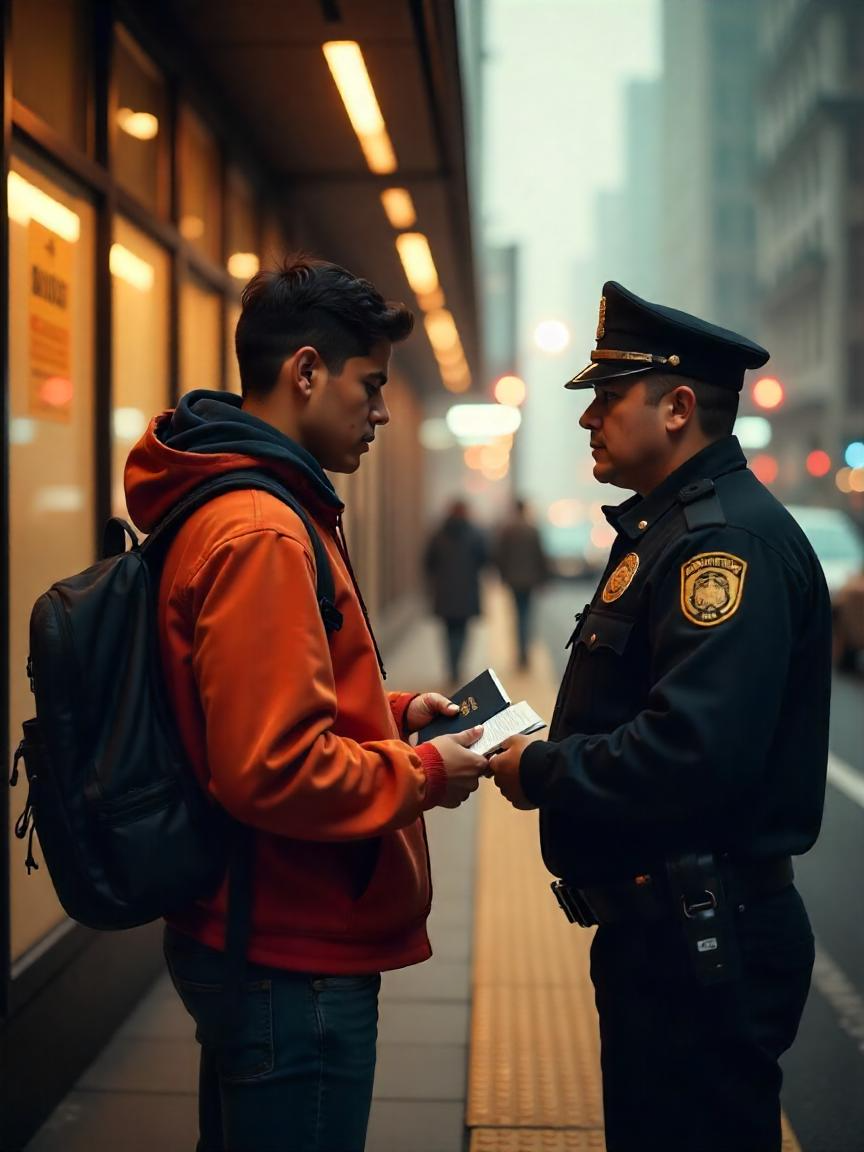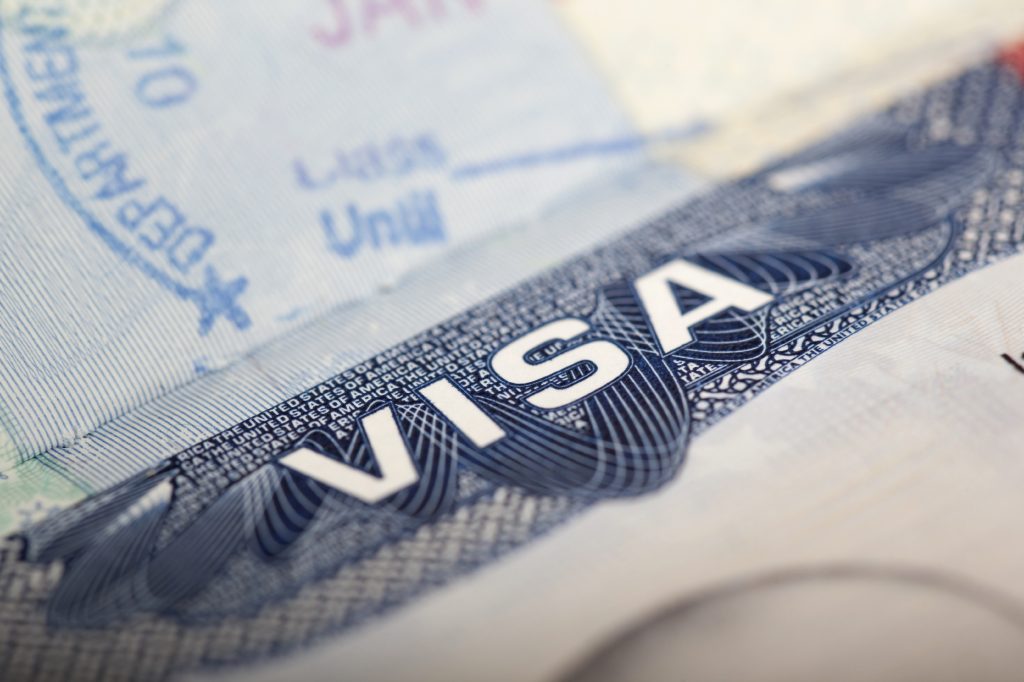
What To Do If The Police Ask About Your Immigration Status in Houston, Texas
Having an encounter with the police can be a nerve-wracking experience for both immigrants and non-immigrants. If you’re an immigrant or have unresolved immigration issues, it can make the situation even more complex. By knowing your rights and understanding how to handle these encounters, you can better protect yourself and ensure a safer experience. In this blog, we will discuss what to do if the police ask about your immigration status in Houston, Texas.
Tensions can run high when dealing with police officers, and the way you respond is very important. Neither you nor the officer knows how the encounter might end. Depending on your immigration status, the outcome could have serious consequences. Therefore, it is crucial to remain calm and think carefully before responding, in order to avoid any negative impact on your immigration process.
U.S. immigration law is enforced by federal agencies such as Immigration and Customs Enforcement (ICE), United States Citizenship and Immigration Services (USCIS), and Customs and Border Protection (CBP). State and local police officers generally do not have the authority to enforce federal immigration laws; it is not part of their official duties.
However, in 2017, a law known as Senate Bill 4 (SB4) was passed, granting Texas law enforcement officers the authority to inquire about an individual’s immigration status during lawful detentions or arrests. Texas is one of the few states to have implemented this law.
Read This: How To Apply For USA Citizenship in Houston Texas

Here Are What To Do If The Police Ask About Your Immigration Status in Houston, Texas
1. Know and Understand Your Rights
The first step in handling a police encounter is to know and understand your rights. Regardless of your immigration status, certain fundamental rights are protected under the U.S. Constitution. These include:
- The right to remain silent: Protected by the Fifth Amendment, this right allows you to refuse to answer questions about your birthplace, citizenship status, place of residence, or any other information that could incriminate you.
- The right to refuse consent to a search: The police may only search your home or property if they have a valid search warrant signed by a judge. If they do not, you can politely ask them to leave.
- The right to an attorney: If you face any legal issues as an undocumented immigrant, you have the right to be represented by an attorney.
You are not obligated to disclose your immigration status unless you are being detained by immigration authorities.
2. Be Calm and Polite
It is important to remain calm and respectful during any interaction with the police. Cooperate without volunteering unnecessary information. Avoid arguing, making sudden movements, or acting suspiciously. Reaching for items without permission may be perceived as threatening behavior and could escalate the situation.
Remember, being polite does not mean surrendering your rights. You can assert your rights respectfully.
3. Be Very Observant and Watchful
In some cases, police officers may act outside the scope of the law. If you are arrested or detained without just cause, it’s essential to gather as much evidence as possible. Be proactive in noting the officers’ names, badge numbers, the time, and location of the encounter.
If safe to do so, take photos, record videos, or make audio recordings of the interaction. This documentation could support your case if you need to file a complaint or seek legal assistance later.
4. Don’t Lie – Be Truthful
If you’re an undocumented immigrant, never provide false information to law enforcement officers. Doing so can have serious legal consequences. If you prefer not to answer a question, simply state, “I choose to remain silent.”
Only immigration officers have the legal authority to demand your immigration documents. If requested and you have them on you, present them.
If you do choose to answer questions, be truthful. Providing false information or misrepresenting yourself can lead to criminal charges and negatively impact your immigration process. Misrepresenting yourself as a U.S. citizen, for example, can make you permanently ineligible for citizenship and result in removal (deportation) proceedings.
5. Present Your Documents
When stopped by the police, you may be asked for identification. If you are an immigrant aged 18 or older and have legal status, you should always carry your immigration papers—this may include your passport, green card, Adjustment of Status documents, or any document with your Alien Registration Number.
If you are a U.S. citizen, you do not need to carry immigration documents. A state-issued driver’s license will usually suffice as proof of legal residence.
6. Know Your Local Policies
Local enforcement of immigration laws can vary. It’s important to familiarize yourself with the local policies in your area. Know the laws regarding traffic stops, local cooperation with ICE, and other relevant immigration practices. Understanding your community’s specific policies can help you navigate encounters with law enforcement more confidently.
When to Exercise Your Right to an Attorney
If a police officer searches your property without a warrant, questions your immigration status unlawfully, or detains you without cause, you should request to speak to an attorney immediately.
Having legal representation ensures your rights are protected, prevents misuse of authority, and provides access to accurate legal guidance. A competent immigration attorney can speak on your behalf, advocate for your case, and work to protect your stay in the U.S.
Even if you cannot afford an attorney, you can request that one be appointed at no cost. U.S. law ensures everyone has fair access to legal representation, regardless of immigration status.
You should seek legal counsel if:
- You are arrested as an immigrant and it may jeopardize your stay in the U.S.
- You chose to remain silent when asked about your immigration status.
- Your rights were violated by the police during the encounter.
- You are facing deportation and your case has been referred to an immigration judge.
Note:
If you were assigned an attorney and you are not confident in their ability to represent you, you are entitled to seek a different attorney. If a previous attorney’s mistakes negatively impacted your case, you may be eligible to resubmit your application with the help of competent legal counsel.
@legallyuzo Don't do these things if you want to be a US citizen. 1. rovide false information or commit fraud during the immigration process 2. Failure to pay taxes or failure to file income tax 3. Sectons criminal convictions, especial felonies, can impact your Hability for citizenship Visit: https://www.mokololaw.com/practice/immigration-law/
♬ original sound – Legallyuzo
Lastly On What To Do If The Police Ask About Your Immigration Status in Houston, Texas
Encounters with law enforcement can be stressful, especially when questions about your immigration status are involved. It is wise to consult with an immigration attorney to ensure you receive accurate legal advice tailored to your specific situation. Having the right legal representative by your side can make all the difference between staying in the U.S. or facing deportation.
Find Immigration Experts to Protect Your Rights
Contact the Skilled Immigration Lawyers at Mokolo Law Firm.
Our experienced immigration attorneys can speak on your behalf, help you avoid costly mistakes, and protect you from deportation. We understand how quickly things can escalate for undocumented immigrants during law enforcement encounters. Let us guide and represent you through the legal process and fight for the best outcome possible.

How To Apply For USA Citizenship in Houston Texas
So many legal and permanent immigrants residing in the U.S.A. have a desire to fulfil “The American Dream”. Such a dream can never be fulfilled without being a citizen of the country. Being a lawful permanent resident, you could be lucky to be eligible to become a U.S. citizen through naturalization. However, getting citizenship is a big mountain to climb, and you will need the help of an experienced immigration attorney and also have the proper understanding of the naturalization process.
How To Apply For USA Citizenship in Houston Texas
What Is Citizenship?
Citizenship is a legal status and relation between an individual and a state, granting rights and responsibilities. This status can be acquired through birth by U.S citizen parents, naturalization, or other means, such as declaration or inheritance. It is similar to naturalization. It has so many benefits and responsibilities that are beneficial to an individual. Its responsibilities are obeying laws, paying taxes, and serving on juries.
Benefits of U.S. Citizenship
- The right to remain in the United States as a United States Citizen
- Eligibility for a U.S. passport to travel internationally
- Work without restrictions
- The right to vote, hold elected public office, and apply for certain federal and state jobs
- Avoiding green card renewal fees
- Receive protection from the government
- -The advantage of bringing in family members to the United States
- The opportunity for citizenship for your LPR children under 18 years of age.
What Is Naturalization?
Unlike citizenship, naturalization is the legal process through which one acquires the nationality or citizenship of another country. It’s a remarkable way for immigrants who want to become well-recognized citizens of their new nation. The ultimate goal of naturalization is to grant individuals the same rights and responsibilities as those with natural-born citizenship, allowing them to fully participate in the country’s social, economic, and political life.

How To Apply For USA Citizenship in Houston Texas Through the Naturalization Process
Before you can become a citizen, you need to apply and go through the naturalization process. Applying for U.S. citizenship in Houston, Texas, is a well-structured and long process that involves several key steps. And the steps are:
1. Eligibility
Before applying for citizenship, you need to determine your eligibility for naturalization and make sure you meet the compulsory criteria (unless they qualify for an exemption or apply based on their U.S. military service). While some criteria are straightforward, others take some planning. To be eligible for naturalization, you must:
- Be of the minimum required age (typically, at least 18)
- Continuously and physically live in the United States as a green card holder for a certain number of years
- Establish residency in the state or U.S. Citizenship and Immigration Services (USCIS) district where they intend to apply
- Have “good moral character”
- Be proficient in basic spoken and written English and demonstrate knowledge of U.S. history and government
- Register for military service (if a male of a certain age) and be willing to perform civil service when required-Register for military service (if a male of a certain age) and be willing to perform civil service when required
- Swear allegiance to the United States
2. Prepare and Submit Form N-400
The Form N-400 is the official document to apply for U.S. citizenship, which is known as the Application for Naturalization. When filling this out, ensure you include the necessary documentation and the filing fee and the biometric services fee. And take note that free waivers are available for eligible applicants. The process to fill this form is:
- Applicant will create a free account and file online through the USCIS website.
- Or mail the completed form to the appropriate address listed on the USCIS direct filing addresses page.
3. Biometrics Appointment
After submitting your application, a biometrics appointment will be scheduled by USCIS at a local Application Support Center (ASC). At this stage, your personal information will be collected for the background check. Information like your fingerprints, photograph, and signature.
4. Interview and Tests
USCIS will send you a notification of a scheduled date and location of your naturalization interview, usually at the Houston Field Office. At the interview, a USCIS officer will review your N-400 application, you will be tested on the English language, which includes reading, writing, and speaking components, and you will also take the civics test, covering U.S. history and government.
5. USCIS Decision
After the interview, USCIS will provide a written notice decision of your interview. The decision could be: your application is approved, additional documentation is needed, you need to retake the tests, or your application is denied.
6. Attend the Oath Ceremony
After approval, a naturalization ceremony will be scheduled, where you will take the Oath of Allegiance to the U.S. A. This is the final step in becoming a U.S. citizen, and you will receive your Certificate of Naturalization.
Denied Citizenship Application
Sometimes, after the application submission and the interview process is completed, it’s still possible to get a denial response from USCIS. Even if you met all the eligibility requirements, here are some of the most common reasons citizenship applications get denied:
- Missing documents or incomplete forms
- Having a criminal record
- Failing the language proficiency or civic knowledge tests
- Providing false information or misrepresenting facts on your application
@legallyuzo Don’t do these things if you want to be a US citizen. 1. rovide false information or commit fraud during the immigration process 2. Failure to pay taxes or failure to file income tax 3. Sectons criminal convictions, especial felonies, can impact your Hability for citizenship Visit: https://www.mokololaw.com/practice/immigration-law/
♬ original sound – Legallyuzo – Legallyuzo
Final Words On How To Apply For USA Citizenship in Houston Texas
If you’re ready to take the next step to become a naturalized citizen, contact a reputable Houston immigration and naturalization attorney for a consultation. At Mokolo Law Firm, we counsel each client about what to expect during the naturalization process, and answer all questions and concerns along the way.
Our goal is to provide legal guidance to permanent residents who apply for citizenship through the USCIS naturalization process, educate them to understand all the rights and responsibilities that come with citizenship and finally to help them become U.S. citizens to fulfill their American Dream.

How to Protect Your Global Assets as a Nigerian Living in Texas
As a Nigerian living in Houston, Texas, having assets back home is one of the biggest achievements most people in the diaspora dream of, but managing and protecting your assets can be a very difficult task without the right strategic planning. Whether you own real estate, a business, or investments in the U.S., safeguarding all you have been able to achieve from economic instability, legal risks, and unforeseen challenges is very important. In this blog post, we’ll explore how to protect your global assets as a Nigerian living in Texas USA.
How to Protect Your Global Assets as a Nigerian Living in Texas
1. Diversification of Your Investments
One of the best ways to protect your assets is through diversification. That means you should avoid focusing your wealth on one country, currency, or asset type. When you diversify, your wealth still remains stable even if the economy is in chaos elsewhere.
How to Diversify
- If you are into Real Estate, it is wise to invest in properties both in Nigeria and the U.S. to balance risks from currency fluctuations or political instability.
- If you are into Stocks and Bonds, consider U.S. and global markets, including Exchange-Traded Funds (ETFs) and mutual funds.
- If you’re into digital investments or cryptocurrency, consider Bitcoin or other stable coins as a hedge against inflation.
- If you are into business investments, spread your investments across different industries and jurisdictions to minimize risks.
- If you own a brand, register trademarks in both the U.S. and Nigeria to prevent infringement.
- If running a business, register in a business-friendly state (e.g., Texas or Delaware) for tax benefits.
2. Legal Structuring of Your Assets
If you have significant assets in Nigeria or internationally, setting up a legal structure can safeguard your wealth from risks such as legal claims, taxation, or economic downturns. By structuring your assets properly, you ensure legal protection and efficient wealth transfer.
How to have a proper legal structure of your assets:
- Set up a trust or limited liability company (LLC) to shield your assets from lawsuits, taxation issues, and inheritance complications. Creating a trust can help you manage assets for your family while minimizing tax liabilities, and registering your business in a U.S. LLC or Corporation it gives your business stronger legal protection.
- Ensure your estate plan aligns with both U.S. and Nigerian laws to prevent legal conflicts at all costs.
- Give power of attorney by assigning a trusted representative for your assets in Nigeria to oversee transactions in your absence.
- A holding company in a business-friendly jurisdiction can add an extra layer of protection.
3. Use Dual Banking Systems
Having bank accounts in multiple countries, especially in the US and Nigeria, where your assets are, can provide financial flexibility and security. By leveraging a dual banking system, you protect yourself from financial instability in any one country.
Banking Strategies include:
- Maintaining a U.S. bank account ensures access to stable banking services, while a Nigerian account facilitates transactions in Nigeria. Having a dual account will help to manage currency fluctuations.
- For added protection, consider offshore accounts by exploring financial hubs, which offer tax advantages and asset protection.
- Using Fintech Solutions Services like Flutterwave, etc., allows seamless international transactions and currency exchanges. This will also help to avoid excessive fees.

4. Get Adequate Insurance Coverage
Insurance is a critical tool for asset protection, especially when dealing with international risks. Insurance minimizes financial risks and ensures peace of mind.
Types of Insurance that are a must-have include:
- Property Insurance will protect your real estate investments in both Nigeria and the U.S.
- Choose a life insurance policy that covers your family’s needs in case of unexpected events.
- As a business owner, ensure you have Business Insurance in place. This will keep your liability and assets protected.
- Having international health insurance coverage ensures you’re covered anywhere you go around the world.
5. Plan for Currency Fluctuations and Inflation
The Nigerian Naira is prone to devaluation, so it is essential to protect your wealth against currency risks. By planning for currency fluctuations, you prevent loss of value in your assets.
Ways to plan for currency fluctuations and Inflation
- Hold Assets in stable currencies in U.S. dollars, British pounds, or euros. This provides more stability for your assets.
- Use Forex Accounts to avoid sudden exchange rate losses.
- Invest in Gold & Precious Metals as they act as hedges against inflation.
6. Cybersecurity & Digital Asset Protection
Cyber fraud and scammers are currently on the rise, to protect your digital assets and enhance cybersecurity consider the following:
- Utilize secure financial platforms always by activating two-factor authentication (2FA) on your banking and investment accounts to enhance security.
- Safeguard digital assets by using reputable password managers and maintain an up-to-date digital will to securely store cryptocurrency keys, passwords, and essential documents.
- Stay vigilant against scams and be cautious of fraudulent investment schemes, especially those targeting individuals in Nigeria and the U.S.
7. Have an Estate Plan and Will
To protect your global assets for future generations, have a proper estate plan in place. Proper estate planning prevents inheritance disputes and ensures your legacy is preserved.
Use these steps to secure your wealth:
- Write a will to ensure your assets are distributed according to your wishes in case of death or incapacitation.
- Set up a living trust that can prevent legal battles and make asset transfer seamless.
- Appoint power of attorney to legal professionals who understand U.S. and Nigerian inheritance laws to manage your affairs in case of emergencies.
- Secure a global life insurance policy to protect your beneficiaries.
8. Stay Compliant with U.S. & Nigerian Tax Laws
Taxes can be complex when managing wealth across different countries. Avoid legal troubles by staying compliant with tax laws because ignoring tax obligations can lead to heavy fines and asset seizures.
Here are some Tax Compliance Tips you can consider:
- If you have significant assets abroad, comply with the U.S. Foreign Bank Account Reporting (FBAR) and Foreign Account Tax Compliance Act (FATCA). Report foreign bank accounts if the total exceeds $10,000 to avoid U.S. penalties.
- Understand double taxation treaties, as the U.S. and Nigeria have agreements to prevent double taxation—consult a tax expert to maximize benefits.
- Stay updated on Nigerian tax policies to prevent asset seizure or fines.
- Work with a tax expert specializing in U.S.-Nigeria taxation to optimize tax efficiency legally and minimize your tax burden while staying compliant.
9. Secure Real Estate Investments
- Conduct due diligence of the “Title Verification” of a property before purchasing Nigerian properties to prevent fraud.
- Hire a reputable property management firm to oversee maintenance and rental agreements of your properties.
- Get property insurance coverage in both countries for protection against natural disasters and theft.
@legallyuzo Who should get a prenup? Short answer: EVERYBODY Visit: https://www.mokololaw.com/practice/prenuptial-and-postnuptial-agreements/
♬ original sound – Legallyuzo
Find out more about Prenuptial and Postnuptial Agreements or watch the above tiktok video for a short answer on “who should get a prenup?“.
Final Words
As a Nigerian living in Texas, protecting your global assets requires a proactive. By implementing these strategies, you can safeguard your wealth across borders and ensure long-term financial stability for yourself can secure your wealth for the future.

President Biden’s Executive Orders Affecting Immigration
President Biden’s Executive Orders on Immigration

U.S. Citizenship Through Naturalization
A guide to obtaining your US Citizenship through the Naturalization process

DACA
DACA has been reinstated. New applicants are eligible to apply again! Check out K&M’s lastest blog post and see if you qualify.

What is a U-Visa?
The U nonimmigrant status (U visa) is set aside for victims of certain crimes who have suffered mental or physical abuse and are helpful to law enforcement or government officials in the investigation or prosecution of criminal activity.



